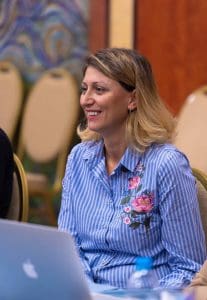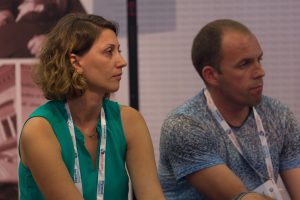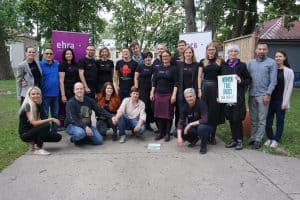EHRA presents a series of conversations with people whose names and roles in harm reduction are well known in the region of Central and Eastern Europe and Central Asia, and beyond. They will share with us the most valuable – their experiences, thoughts, memories.
Marina (Mari) Chokheli is the Chair of the Steering Committee of the Eurasian Harm Reduction Association (EHRA) and Coordinator of Harm Reduction and Access to Medicine Programs, Open Society Georgia Foundation (OSGF). She has been working for OSGF since 2010 and actively engaged in various areas related to public health, harm reduction and access to Medicines: community mobilization; strengthening and capacity building of community organizations and activists, promoting human rights of vulnerable groups; drug policy and promoting humane and efficient law enforcement policies and practices affecting vulnerable groups; advocating, developing and launching of the first National Hepatitis C treatment programs in Prison and for general population in Georgia.
And what’s more, she is an amazingly sincere, attentive and responsive person.
– Mari, when and how did you come to work in harm reduction?
– (Smiling) Sometimes you do not even feel as time goes by. It has been a long time, about twelve years ago. I worked in human rights sphere and often interacted with PUD living with HIV who stayed in places of confinement. They needed methadone programs and access to treatment. Even back then I realized that harm reduction is not just about the right to health, it is an integral part of the rights of all people (though we still have to prove it in many countries of our region). I started searching for information, subscribed to the regional ITPC mailing list. Though it was focused on HIV, it also contained discussions on the strategic litigation in the European Court of Human Rights, in particular on access to medical services.
 Now, thanks to social media, finding information is not a problem, but then you could only look through mailing lists and websites. Nothing else. Needless to say, I did not know about any organizations working in harm reduction in Georgia. I met them later, through different conferences and international networking events. That was my first experience.
Now, thanks to social media, finding information is not a problem, but then you could only look through mailing lists and websites. Nothing else. Needless to say, I did not know about any organizations working in harm reduction in Georgia. I met them later, through different conferences and international networking events. That was my first experience.
– Did you have a chance to work in a national harm reduction organization in Georgia?
– I worked with court proceedings, strategic litigation, dealt with constitutional cases, in particular those which further went to the European Court of Human Rights. As soon as I changed the area of my activities, I saw a relevant vacancy in the Open Society Georgia Foundation. In fact, I had several job offers, but I chose OSGF as it is a place where you always remain an activist. Sure, there is a strategy, there is a certain structure, but still you are free in your planning, you are involved in processes at all levels, you work directly with activists and learn about the relevant needs and issues first-hand from them. Besides, in OSGF there are opportunities to learn and gain experience. If you want to suggest something new and innovative within or beyond the existing strategy – you are welcome! It is a very favorable environment.
Sometimes we pilot projects with no significant resources: we initiate those projects and strive to make a certain problem visible, mobilize activists and resources to solve it. Gradually, other people join us, we have more allies, we raise funding. That is when we can step aside. When you work in OSGF, you are not just a donor, who only reads reports, plans strategies and announces calls for proposals. You are involved in all the processes from planning to implementation.
– Do you still work there?
– Yes, I am a Coordinator of Harm Reduction and Access to Medicine Programs.
– Great! Mari, taking into account your workload, we are especially glad to see you as the Chair of the EHRA Steering Committee! How did your relations with the Association develop?
 – I have an extensive experience of working with EHRA. Our roads often crossed, sometimes even not within a particular project, but within different initiatives. There are many creative ideas in our region. I like it when you have some idea at your country level and EHRA already develops the same idea at the regional level.
– I have an extensive experience of working with EHRA. Our roads often crossed, sometimes even not within a particular project, but within different initiatives. There are many creative ideas in our region. I like it when you have some idea at your country level and EHRA already develops the same idea at the regional level.
– Could you give an example, please.
– Maybe because I come from the human rights sphere, I have always thought that building partner relations between human rights organizations and harm reduction organizations (first of all at the local level) is kind of a cornerstone. So we continued this work, also in the area of strategic litigation. It really helped us to make a few steps ahead. Firstly, because we had more supporters. Secondly, because with the same advocacy efforts strategically you prove to the state that it is mistaken, that it violates your rights. Thus, you manage to achieve systematic changes at the precedent level.
– So we raised the issue of advocacy. In your opinion, how different is this process at the national and regional levels?
– It is a difficult question. On the one hand, each country has its peculiarities and specificities. The approach that works in Georgia could fail in another country, and vice versa. On the other hand, regional advocacy campaigns often make your position stronger and help you to further plan your activities. When the messages relevant to your country are presented under a common “umbrella,” it makes them stronger!
What is also important is that at the national level you focus on your own experience, knowledge, resources (in particular, intellectual resources). At the regional level, you also embrace other people’s experience – both positive and negative. After analyzing this information, you go to implementation. When we had tenders for the Hepatitis C program in Georgia, we in OSGF learned from our Ukrainian colleagues how they plan such procedures in their country and we also cooperated with the Egyptian activists, who wrote a similar program and have already done something like what we were doing. We were equipped with information, which greatly influenced the outcome. Regional advocacy is not easy, but it is very strong!
– You said the work “campaign.” Last year, at the International AIDS Conference in Amsterdam there was a campaign initiated by the key populations networks from EECA called ‘Chase the Virus, not People!’ Why do you think such advocacy activities are important and do you think this campaign should be continued?
 – This campaign showed itself, its goal is vital. Regional campaigns are very important in general, especially in the context of countries transitioning to domestic funding. The only thing I would consider is that, when we develop advocacy messages, we should try to make them clear not only to us, not only to those who work in harm reduction, but also to people who are, let’s say, out of this topic: economists, lawyers, politicians, etc. Everyone! This is what I would consider in future. Unfortunately, there are very few examples in countries or regions, where the message would cover all the population, touching the hearts of various people.
– This campaign showed itself, its goal is vital. Regional campaigns are very important in general, especially in the context of countries transitioning to domestic funding. The only thing I would consider is that, when we develop advocacy messages, we should try to make them clear not only to us, not only to those who work in harm reduction, but also to people who are, let’s say, out of this topic: economists, lawyers, politicians, etc. Everyone! This is what I would consider in future. Unfortunately, there are very few examples in countries or regions, where the message would cover all the population, touching the hearts of various people.
– Is it important for the community networks to cooperate in such a format?
– Sure, of course! It took us a long time to reach common ground, but leaving behind some nuances, we all have one goal – to survive and live full lives! That is why I think it is important for us to unite within such campaigns and networks. Our voice is to be heard.
– We are having this conversation within the EHRA five-year strategic planning meeting. That is why I have two questions to you. What objectives set forth in the previous strategy did EHRA achieve and what it did not? And what should be included into the new strategy?
– During this meeting, we had a lot of discussions with the EHRA Steering Committee and Secretariat – not only about our achievements, but also about the things we failed to achieve. I think it is a right approach, when, planning your future, you analyze and take into account all the lessons learnt. The work that we did was not easy. Transformation of the Association was a crucial task. I am glad to say that it was a success as well as our regional advocacy. EHRA clearly realized the goals and needs of every country, helping to bridge the gaps. Gradually, strengthening the community, conducting assessments, overcoming barriers and analyzing what works well led to the next step – advocacy, specifically advocacy together with the community. This is what we have been doing and I would surely continue these efforts.
 As for our next mission, I believe that it should be very ambitious, even cosmic! When you go beyond what you think is real, you achieve more. In my work, I often follow the rule: “Plan as much as possible to get what you want.”
As for our next mission, I believe that it should be very ambitious, even cosmic! When you go beyond what you think is real, you achieve more. In my work, I often follow the rule: “Plan as much as possible to get what you want.”
“We often talk about the “community” and “experts.” In five years, I would like to see a strong community of experts, who defend their rights and engage in all the decision-making processes. I would like to make it real, not just a slogan or a formality.” It depends not only on funding – programs can be implemented even with fewer resources. We have learned something, we already have some knowledge. The main thing is providing access to quality services. Everything should be based on the vital needs. I will give an example: in most countries, naloxone nasal spray is not available, while injecting naloxone is sold by prescriptions, and we are talking about the medicine used in case of overdoses and which save lives!
– What does harm reduction mean to you?
– For me, harm reduction means that a person should have everything he or she needs to stay safe, to stay alive, with the feeling of dignity and all human rights. Harm reduction is a program, which is always aimed at risk reduction and care, though it may change depending on the drug scene and the situation in society, on the new psychoactive substances appearing, etc. However, the basic harm reduction package should be: a) needs-based, b) individual.
– Mari, with the schedule you have…
 – (Laughing) I have none! Working at the weekend and exchanging emails with colleagues at 3 a.m. is my usual routine. But I am lucky: I spend my whole life where I want to be, I wake up in the morning – and I am happy to go to work, meet new people, learn new things, and do what brings me moral satisfaction. My work is more than just complying with my job description.
– (Laughing) I have none! Working at the weekend and exchanging emails with colleagues at 3 a.m. is my usual routine. But I am lucky: I spend my whole life where I want to be, I wake up in the morning – and I am happy to go to work, meet new people, learn new things, and do what brings me moral satisfaction. My work is more than just complying with my job description.
– So your work is your lifestyle? How do you manage not to burn out?
– The best way to relax for me is going to the mountains for a couple of days. Turning my phone and internet off. When I look at the nature, look at those magnificent mountains, all my problems seem so tiny… It is a great feeling! You re-assess everything. All your troubles, all the things inside you that you are not happy with – it all goes away. Even if I stay in the mountains for just three days, I have a feeling that I had a four-week vacation. My strength comes back to me, the puzzle in my head puts together, and I can clearly see my priorities. Mountains help me to stay true to myself. No matter what.
